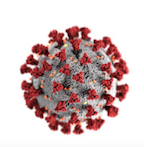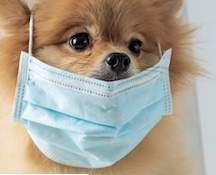What is SARS-CoV-2?

SARS-CoV-2 is a new type of coronavirus that has not previously been identified. This virus is not the same as canine coronavirus (CCoV). CCoV does not affect people – it causes gastrointestinal problems in dogs, particularly in puppies, as opposed to respiratory disease.
Coronaviruses are a family of viruses characterized by crown-like spikes on their surface as seen under the microscope. There are many viruses in this family that cause various types of diseases, such as diarrhea and upper respiratory infections.

At this time there is no evidence that any animal or pet can infect humans with the new coronavirus. Additionally, no animals to date have been reported to be sick with COVID-19.
Can my pet be affected by COVID-19?
At this time, there is no evidence that any animal or pet can infect humans with the new coronavirus. Additionally, no animals to date have been reported to be sick with COVID-19.
There was a single case of a dog testing positive for the new coronavirus; however, this dog has remained healthy and the positive result may be due to environmental contamination from the infected owner. In other words, the virus may have been present in the dog’s nose the same way the virus was likely present on other surfaces in the household. It is important to note that the test used is very sensitive and can detect very small fragments of the virus; it does not indicate that the virus was intact or contagious. No other cases of pets testing positive have been reported at this time. Further blood testing is being performed to evaluate if this dog is truly infected. If this blood test is positive, this would be a case of human to animal transmission of the new coronavirus; however, this would not be evidence that an animal can infect others. Because this is a new virus and information is still being collected, as a precaution, restrict contact with your pets if you are diagnosed with COVID-19. If this is not possible, practice good hygiene and wash your hands before and after touching your pet, avoid close contact, and wear a facemask.
How is it transmitted?
Current evidence suggests that person-to-person spread is the main source of infection. This occurs through respiratory droplets created when an infected person sneezes or coughs. There is also a possibility of spread via objects or surfaces that have been exposed to the virus; however, this is not suspected as a main source of infection.
Should I monitor my pet for any signs?
Because there have not been any documented cases of pets becoming sick with COVID-19, there are no specific recommendations. However, there is still much to learn about this new virus, and vigilance is key. If your pet exhibits signs of illness (coughing, sneezing, fever, abnormally low energy, etc.), particularly if your pet has been exposed to someone known to be infected with COVID-19, call your veterinarian for guidance.
“No, your pet should not wear a face mask.”

Should my pet wear a face mask as a precaution?
No. First, it is unlikely that this will protect your pet from any potential disease transmission. Second, it can cause breathing difficulties, especially in certain breeds of cats and dogs. Third, masks must be saved for use in people withactive signs of infection and medical professionals.
Is there a vaccine?
Currently, a vaccine for this new SARS-CoV-2 coronavirus is not available. There is a vaccine for the canine coronavirus (CCoV), however, this vaccine does not work to protect you or your pet from COVID-19.
If you ever have concerns about your pet’s health, don’t hesitate to call the clinic for advice. We are here and happy to help.
